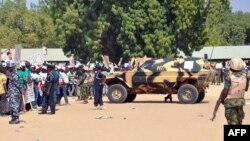The presidential contest between Nigeria’s incumbent President Goodluck Jonathan and main rival General Mohammadu Buhari from the opposition All Progressives Congress (APC) is too close to call, according to the latest Afrobarometer opinion poll.
Survey
2,400 prospective Nigerian voters were interviewed for the Afrobarometer poll, with equal representation across the country, and a margin of error + or - 2 percent.
Nengak Daniel, a senior member of the Afrobarometer team that conducted the study, said the survey was scientific and a true reflection of the prevailing situation on the ground.
“When we asked people who they were going to vote for, we found out that apart from the leading political parties the ruling People’s Democratic Party (PDP) and the main opposition [APC], all other parties stand a very slim chance of winning. Only six percent of people said they were going to vote for them,” said Daniel.
“In terms of the two leading political parties we have a tie,” he said. “42 percent said they will vote for the ruling party as much as 42 percent again said they will vote for the opposition party.”
Daniel said the study asked respondents to predict the winner of the presidential election.
“It turned out that both leading political parties are running neck and neck. Because 39 percent predict that the ruling party will win and 38 percent predict that the opposition would win. The difference between them is small so from our survey, the election is too close to call,” he said.
Daniel said reaction has been mixed about the readiness of the Independent National Electoral Commission (INEC) to administer the February 14 presidential and gubernatorial elections.
“The key finding that we found was that people rated INEC as ready to conduct the election. But this was contrasted by quite a number of people who said that they don’t trust INEC at all,” he said. “But we are likely to expect a high voter turnout, as much as 78 percent of Nigerians said that they will almost certainly come out to vote. It seems everyone was waiting for February 14 to go out and cast their vote.”
Security
Daniel said the Afrobarometer study encountered security challenges in Borno, Yobe and Adamawa states where radical Islamist militant group, Boko Haram has often carried out attacks against unarmed civilians.
“What we did in order not to compromise the integrity of the survey was to conduct the survey in neighboring states in the northeastern part of Nigeria in order to ensure that the findings coming from the northeast are not affected by the loss of those three states,” he said.
Daniel said the poll finds a significant number of voters in the country’s north will participate in the election in spite of the threats of violence from Boko Haram militants.
“It was surprising to find out that the highest number of voters will actually be coming from the northeastern part of Nigeria. The lowest number of expected voters will be in the south-south zone of Nigeria,” Daniel said.
“One the other hand when we asked for party differences in the northeast where we are having these security challenges, the political parties are actually running neck and neck. 43 percent for the ruling PDP and 44 percent for the opposition party,” he added.





